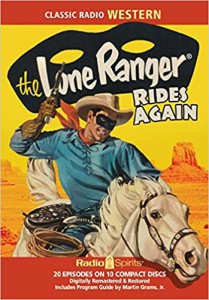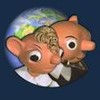The Lone Ranger 1/2956 (Osamělý strážce, 1933-1954, 2013)
 George Trendle a Fran Striker. Rozhlasový dobrodružný seriál. Použitá hudba Gioachino Rossini (William Tell Overture), Bedřich Smetana (Vltava), Richard Wagner (Bludný Holanďan), Ferenc Liszt (Les Preludes), George Bizet, Emil Nikolaus von Reznicek a další. Orchestr řídí Daniel Pérez Castañeda. Režie James Jewell.
George Trendle a Fran Striker. Rozhlasový dobrodružný seriál. Použitá hudba Gioachino Rossini (William Tell Overture), Bedřich Smetana (Vltava), Richard Wagner (Bludný Holanďan), Ferenc Liszt (Les Preludes), George Bizet, Emil Nikolaus von Reznicek a další. Orchestr řídí Daniel Pérez Castañeda. Režie James Jewell.
Osoby a obsazení: Osamělý jezdec – John L. Barrett (testovací díl, 1933), George Seaton (pod pseudonymem George Stenius, 31. 1. – 9. 5. 1933); James Jewell (v jedné epizodě), neznámý herec pod pseudonymem Jack Deeds (v jedné epizodě), Earle Graser (16. 5. 1933 – 7. 4. 1941); Brace Beemer (18. 4. 1941 – 1954), Fred Foy (29. 3. 1954). Tonto – John Todd, Roland Parker; Dan Reid (Bob Martin, James Lipton a Dick Beals). Dále účinkují Jay Michael, Bill Saunder, Paul Hughes, John Hodiak, Janka Fasciszewska, Rube Weiss, Liz Weiss a další.
Natočeno 1933 (WXYZ, od 1942 NBC´s Blue Station) – 1954. Premiéra 1. dílu 30. nebo 31. 1. 1933 (WXYZ radio station).
Vydalo Onesmedia v roce 2013 (32 CD; ASIN B005G8CV4E) pod názvem The Lone Ranger Rides Again.
Lit.: anonym: “The Lone Ranger” debuts on Detroit radio. In web History, 16. 11. 2009 (článek). – Cit.: With the stirring notes of the William Tell Overture and a shout of “Hi-yo, Silver! Away!” The Lone Ranger debuts on Detroit’s WXYZ radio station.
The creation of station-owner George Trendle and writer Fran Striker, the “masked rider of the plains” became one of the most popular and enduring western heroes of the 20th century. Joined by his trusty steed, Silver, and loyal Native American scout, Tonto, the Lone Ranger sallied forth to do battle with western outlaws and Native Americans, generally arriving on the scene just in time to save an innocent golden-haired child or sun-bonneted farm wife.
Neither Trendle nor Striker had any connections to or experience with the cowboys, Indians, and pioneers of the real West, but that mattered little to them. The men simply wanted to create an American version of the masked swashbuckler made popular by the silent movie actor Douglas Fairbanks in The Mark of Zorro, arming their hero with a revolver rather than a sword. Historical authenticity was far less important to the men than fidelity to the strict code of conduct they established for their character. The Lone Ranger never smoked, swore, or drank alcohol; he used grammatically correct speech free of slang; and, most important, he never shot to kill. More offensive to modern historical and ethnic sensibilities was the Indian scout Tonto, who spoke in a comical Native American patois totally unrelated to any authentic Indigenous dialect, uttering ludicrous phrases like “You betchum!”
If you enjoyed this post, please consider to leave a comment or subscribe to the feed and get future articles delivered to your feed reader.






Komentáře
Zatím nemáte žádné komentáře.
Napište komentář k článku